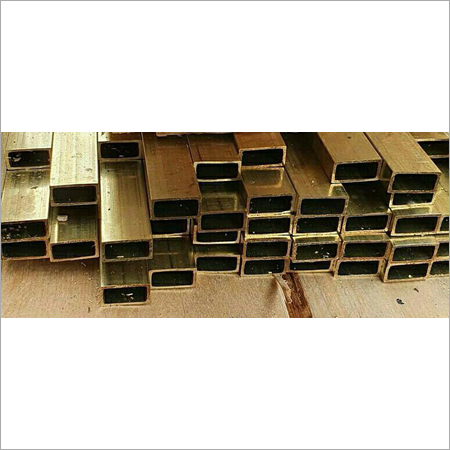
Brass Rectangular Pipe
750.00 - 800.00 INR/Kilograms
Product Details:
X
Brass Rectangular Pipe Price And Quantity
- 500 Kilograms
- 750.00 - 800.00 INR/Kilograms
Brass Rectangular Pipe Trade Information
- 20000 Kilograms Per Week
- 10-12 Days
Product Description
Brass Rectangular Pipe is known to last the longest contrasted with other pipes. It is flexible and durable to take tearing and wearing impacts until the expected service life. This pipe likewise showcases high heat tolerance, corrosion resistance, and deformation-safe properties when used in hot water channelling applications. In addition, our Brass Rectangular Pipe is an astounding heat conductor, allowing systematic, efficient, and easy hot water distribution.
Some common uses of brass rectangular pipes include:
1. Plumbing: Brass pipes are often used in plumbing systems due to their corrosion resistance and durability.
2. Architectural Applications: Brass rectangular pipes can be used for decorative and architectural purposes, such as handrails, staircases, and interior design elements.
3. Heat Exchangers: The excellent thermal conductivity of brass makes it suitable for use in heat exchangers.
4. Musical Instruments: Brass pipes are used in the construction of musical instruments, like trumpets, trombones, and saxophones.
5. Automotive and Aerospace: Brass pipes find applications in the automotive and aerospace industries, where they are used for hydraulic lines, fuel lines, and other applications.
6. Electrical Conductors: In some cases, brass pipes are used as electrical conductors due to their good electrical conductivity.
FAQ:
Q. What is a brass rectangular pipe?
Ans: A brass rectangular pipe is a tubular structure made from brass metal, with a rectangular cross-section. It is used in various applications due to the properties of brass, such as corrosion resistance and malleability.
Q. What are the advantages of using brass rectangular pipes?
Ans: Brass rectangular pipes offer several advantages, including corrosion resistance, durability, good thermal conductivity, and an attractive appearance. They are also relatively easy to work with and can be soldered or brazed.
Q. Where are brass rectangular pipes commonly used?
Ans: Brass rectangular pipes find applications in plumbing, architectural design (e.g., handrails and decorative elements), heat exchangers, musical instrument construction, automotive and aerospace industries, and electrical conductors.
Q. How do you choose the right brass rectangular pipe for a specific application?
Ans: When selecting a brass rectangular pipe, consider factors such as alloy composition, wall thickness, dimensions, and the specific requirements of your project. The choice will depend on the application's needs in terms of strength, corrosion resistance, and aesthetics.
Q. Can brass rectangular pipes be used for drinking water plumbing?
Ans: Yes, brass is a suitable material for drinking water plumbing because it doesn't corrode easily, ensuring the safety and quality of the water supply.
Q. Are there different types of brass alloys for rectangular pipes?
Ans: Yes, there are various brass alloys available, with different proportions of copper and zinc, and sometimes other elements. The choice of alloy will depend on the desired properties for your application.
Q. How do you join brass rectangular pipes?
Ans: Brass pipes can be joined using methods like soldering, brazing, or compression fittings. The choice of joining method depends on factors like the pipe's wall thickness and the specific application.
Q. Are brass rectangular pipes expensive?
Ans: Brass is more expensive than some other materials like steel or plastic, but its longevity, corrosion resistance, and aesthetic appeal can make it a cost-effective choice for certain applications in the long run.
Q. Can brass rectangular pipes be custom-made to specific dimensions?
Ans: Yes, brass rectangular pipes can often be customized to meet specific size and dimension requirements, depending on the manufacturer or supplier.
Q. What maintenance is required for brass rectangular pipes?
Ans: Brass rectangular pipes may require occasional cleaning and polishing to maintain their appearance. However, they are relatively low-maintenance when it comes to corrosion protection.
Enter Buying Requirement Details
Other Products in 'Brass Pipes' category
"We are Deal in Export Inquiry"



